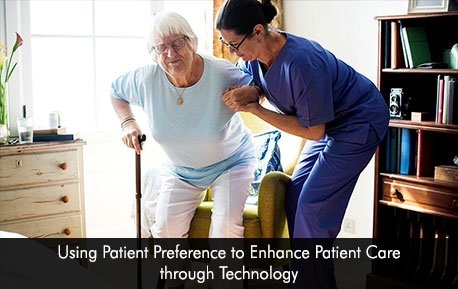Health IT and technology tools have proved to bridge the gap between patient-provider communication, which has ultimately led to enhanced care delivery and improved patient outcomes.
Technology such as patient portals, digital tools, telemedicine, artificial intelligence, EHRs, and online scheduling facility has made it possible for patients to feel an important part in their health care process and this has led to more patient-centered care. Patient adaptation rates to technology depend upon convenience, ease of use, and set of robust features that will reduce patient wait times. It is crucial that health IT integrates into the patient experience which will allow clinicians to better focus on their jobs.
1,000 patients were surveyed to reveal their opinions and preferences related to three major healthcare technologies; telemedicine, AI, and EHR software systems. Let’s dig deeper into each category to find out the preferences of patients in facilitating better patient experiences.
- Telemedicine Software – Patients consider telemedicine software solutions as an effective platform to receive care remotely. It is both convenient and a user-friendly option to get prompt care especially amidst the COVID-19 pandemic. Due to the pandemic telemedicine adaptation rates have increased as both healthcare providers and patients see it as a valuable tool to extend care without having to worry about catching the virus. Patients are also most likely to choose a clinician that offers virtual sessions over those who don’t. Telemedicine is a top choice and preference of patients which will continue to enhance the patient experience in the long run.
- Artificial Intelligence (AI) – Patients have a higher trust rate in healthcare when AI cooperates in it. Patients prefer artificial intelligence being used in different healthcare applications. It was revealed that out of the 1000 patients that were surveyed 64% believe that AI in healthcare ultimately improves patient experience through the use of medical chatbots and machine learning technology. If you’re a small healthcare provider adapting AI in healthcare might seem like an expensive and daunting task. But the good news is there are many EHR software systems that provide AI-powered functionality which does quite well. By running your notes through an intelligent system in your EHR software will support more accuracy in decision making and eliminate the possibility of any errors.
- EHR Software – Patients don’t see how you integrate the use of EHR software system but they, of course, want that their providers use an electronic system which makes daily tasks more efficient. For example, a patient wouldn’t mind the facility to pay online, and the use of patient portals is extremely vital for patients as they can connect with their provider 24/7 and easily review their health information. The use of technology and digital tool to improve the diagnosis and treatment process will enhance the overall patient experience.
Bottom Line
Embracing technology in your practice is a good idea and patients will feel more content and satisfied throughout their treatment process. If you don’t have an EHR software its time you adapt it and look for options that integrate AI-specific features to further enhance patient care keeping in mind patient’s preferences. Many EHR software vendors come with an in-built telemedicine software platform which gives you a greater edge when it comes to remote patient care.







